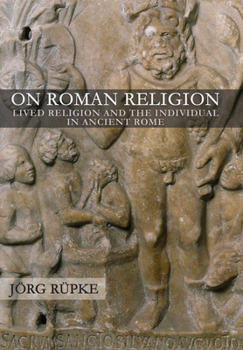On Roman Religion: Lived Religion and the Individual in Ancient Rome
Select Format
Select Condition 
Book Overview
Provocative reading for anyone interested in Roman culture in the late Republic and early Empire. - Religious Studies Review
Was religious practice in ancient Rome cultic and hostile to individual expression? Or was there, rather, considerable latitude for individual initiative and creativity? J rg R pke, one of the world's leading authorities on Roman religion, demonstrates in his new book that it was a lived religion with individual appropriations evident at the heart of such rituals as praying, dedicating, making vows, and reading. On Roman Religion definitively dismantles previous approaches that depicted religious practice as uniform and static. Juxtaposing very different, strategic, and even subversive forms of individuality with traditions, their normative claims, and their institutional protections, R pke highlights the dynamic character of Rome's religious institutions and traditions.
In R pke's view, lived ancient religion is as much about variations or even outright deviance as it is about attempts and failures to establish or change rules and roles and to communicate them via priesthoods, practices related to images or classified as magic, and literary practices. R pke analyzes observations of religious experience by contemporary authors including Propertius, Ovid, and the author of the "Shepherd of Hermas." These authors, in very different ways, reflect on individual appropriation of religion among their contemporaries, and they offer these reflections to their readership or audiences. R pke also concentrates on the ways in which literary texts and inscriptions informed the practice of rituals.





